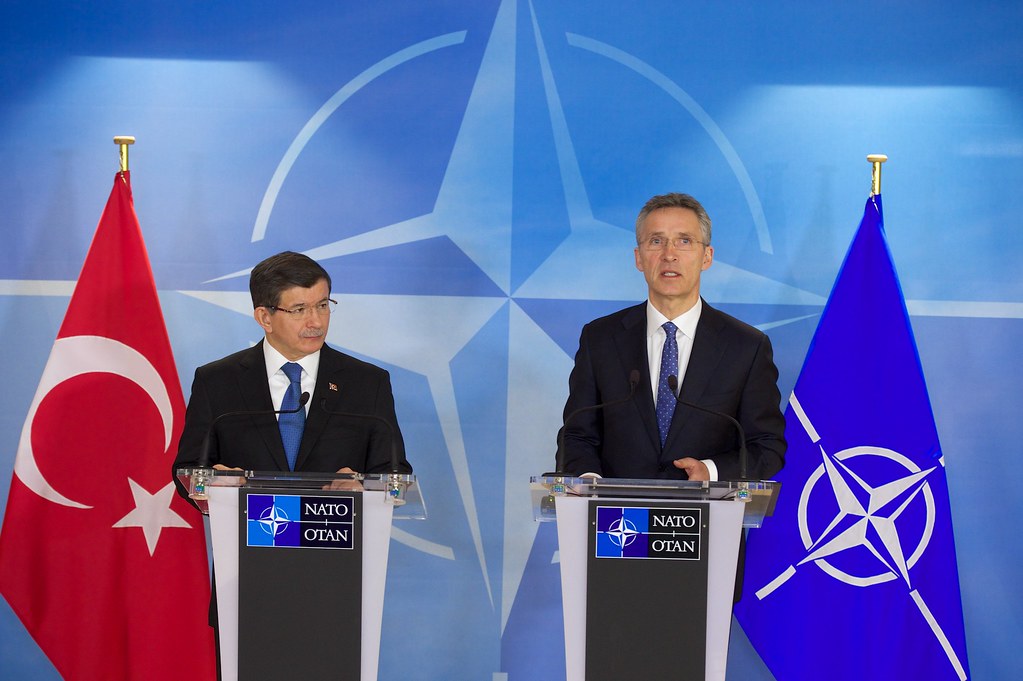Since the fall of the USSR, the Turkish government has contested the usefulness of NATO. This challenge has increased following the recent decisions of the Turkish government: procuring Russian S- 400s, collaborating with the military in Iran, and competing with other members of NATO in the Mediterranean region. How is Turkey acting against the organization, and what are the strategic interests of Turkey?
Turkey’s Acquisition of Russian S-400s: More Than a Military Transaction
Since the annexation of Crimea in 2014, military tensions have intensified between NATO and Russia. The latest Russian military doctrine, published in 2014, qualifies NATO as a threat to Russia’s territorial security.
Yet, in 2019, the Turkish government procured two Russian anti-missile systems (S–400s). The US Congress immediately blocked the delivery of F35 fighter jets to the Turkish army. This acquisition has greatly complicated NATO’s strategy because these systems reveals disclose military information to the Russian government. This military purchase calls into question Turkey’s political intentions. Traditionally, Turkey has been viewed as the “western world’s forward sentinel” against Russia. In the event of a Russian offensive against another NATO country, would the Turkish military still be a reliable partner?
Turkey appears to be getting political concessions from Russia. One of the Russian strategies is to combine sales of military equipment with political negotiations in order to increase its influence in the Middle East. The Russian-Turkish negotiations seem to follow this logic, since a only a few months separate the signing of the Astana talks (May 2017), and the Turkish government’s announcement to obtain S-400s (September 2017). The purchase of the S-400s by the Turkish military has probably resulted in political gains, especially in the Syrian conflict.
The Talks in Astana and the Importance of the “Kurdish Issue” for Turkey
We can observe one constant in Turkish military strategy in Syria, namely to prevent the emergence of a Kurdish autonomous region controlled by the Kurdish Workers Party (PKK).
This strategic imperative explains:
- The last military cooperation between Turkey, Iran and Russia (the Astana and Sochi talks);
- The many criticisms made by the Turkish government against the US army for supporting the Kurdish fighters;
- Turkish attempts to obtain military assistance and guarantees from NATO.
On the one hand, Turkish-Russian and Turkish-Iranian collaborations against the PKK took root at the turn of the new millennium. In 1993, 1994 and 1995, Iran and Turkey signed security protocols, demanding that they no longer support the PKK. In 2000, the Russian and Turkish prime ministers also signed agreements in principle to facilitate the fight against separatists in Russia and Turkey. The Astana talks are also a military coordination to, among other things, fight the PKK in Syria.
On the other hand, during the Iraq war in 2003, Turkey refused to join the Anglo-Saxon coalition on the pretext that the intervention would facilitate the creation of a Kurdistan. During the Syrian conflict, the US military trained and equipped the YPG, a Syrian branch of the PKK.
Thus, the military agreements between Turkey, Iran, and Russia aimed to thwart the military objectives of the US government. These agreements remain problematic for NATO, even though the US government no longer appears to support the PKK. Turkey is working with two countries targeted by EU and US sanctions. At the same time, in 2012, 2015 and 2020, Turkey demanded emergency meetings (under article 4 of the treaty) over the Syrian conflict. This approach has contradictions, since Turkey wants to obtain military support from NATO, while negotiating separately with Iran and Russia.
Turkish Energy Independence at the Center of Tensions in the Mediterranean
Given the strategic importance of the Mediterranean region, Turkey is adopting a risky military strategy:
- Byconducting rival military exercises against France and Greece in the Mediterranean;
- Hasused aggressive rhetoric towards these two NATO countries;
- Bycompeting with Russian strategic objectives in Libya.
In fact, control of the eastern Mediterranean and northern Libya is essential for the country’s energy security. The Turkish economy depends on a constant supply of energy. Not having sufficient energy production capacities for their demand, the Turkish government has to import massive amounts of Russian and Iranian natural gas and oil. In Libya, Turkey supports the Government of National Accord (GNA). The latter controls Sirte, a port city and the majority of Libyan oil wells. Recently, a gas field in the Eastern Mediterranean Sea was discovered by a Turkish company. With control over these two territories, the country could reduce its energy imports and develop an energy policy more independent of Russia and Iran.
Achieving these goals, however, comes at the expense of regional stability. Turkey competes with Greece and France for the same sea areas. The Turkish government has called these two countries imperialist, comparing current interventions to colonial conquests. Without easing tensions, Turkey risks going to war with two allies, in addition to being marginalized within NATO. The Turkish government also competes with Russia in Libya. On the one hand, the Russian army is supporting a coalition led by Marshal Haftar. On the other hand, the Turkish army is training GNA soldiers and Libyan militias. In short, to secure strategic areas, Turkey appears ready to sacrifice its involvement in NATO and to be inflexible towards Greek, French and Russian positions.
The COVID-19 Crisis and Turkey: Economic Recovery and Aggressive Policies
Turkey’s economic situation was already precarious before the Covid-19 Crisis:
- The Syrian and Libyan conflicts, the failed coup d’etat, and the influx of refugees have destabilized the country;
- Since 2018, the Turkish market is considered speculative and risky according to stock market indices;
- The health crisis caused a global economic slowdown, accentuating Turkey’s economic and political problems.
The significant decrease in global tourism and exports has had a significant impact on the Turkish economy. The latest military actions in the Mediterranean are probably taken to revive the economy and to divert attention to their internal difficulties. However, Turkey is acting against Article 1 of the North Atlantic Treaty, as it endangers regional stability and uses force without the consent of the UN.
Recommendations for the Canadian Armed Forces
Turkey appears to view NATO as inadequate for all of its security needs. The country is developing a security policy that includes NATO, Russia and Iran. It participated in the Astana talks, bought Russian S-400s and continued to cooperate with NATO. This security strategy carries significant risks with rising tensions within NATO, against Russia and against Iran.
Turkey’s military intentions remain ambiguous. Some tactics fall below the threshold of war, such as the training of militias in Libya. The Turkish government is arguing with France and Greece, two of Canada’s strategic partners. Finally, Turkey is joining forces with Iran and Russia to change the international order.
Canadian Defense must therefore act prudently:
- To the extent possible, Turkey’s strategic interests should be reconciled with NATO’s overall vision;
- Joint efforts to deter Turkey’s actions can encourage the country to collaborate more with Russia and with Iran;
- At the same time, Canada must demand a dialogue excluding the threat of armed intervention;
- The resumption of discussions between Turkey, Greece and France is necessary, whether within NATO or in a less formal framework.





Comments are closed.